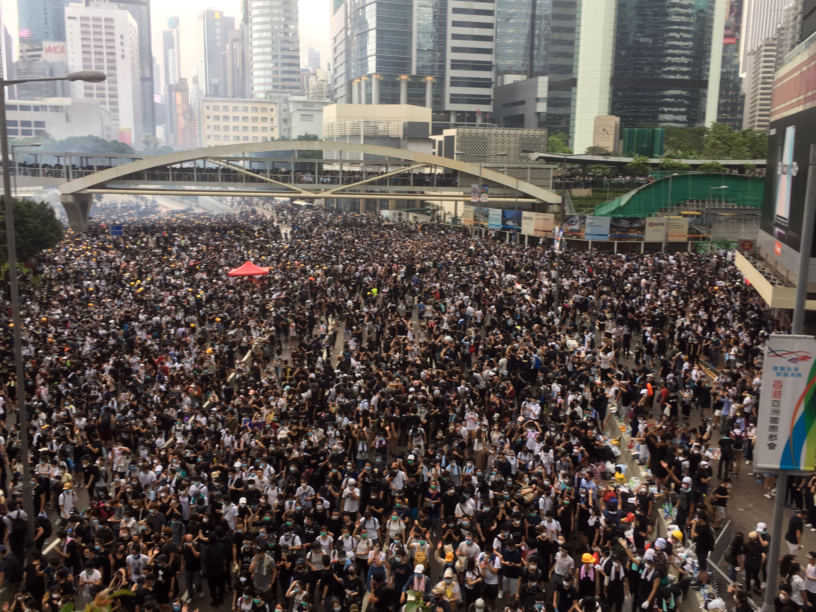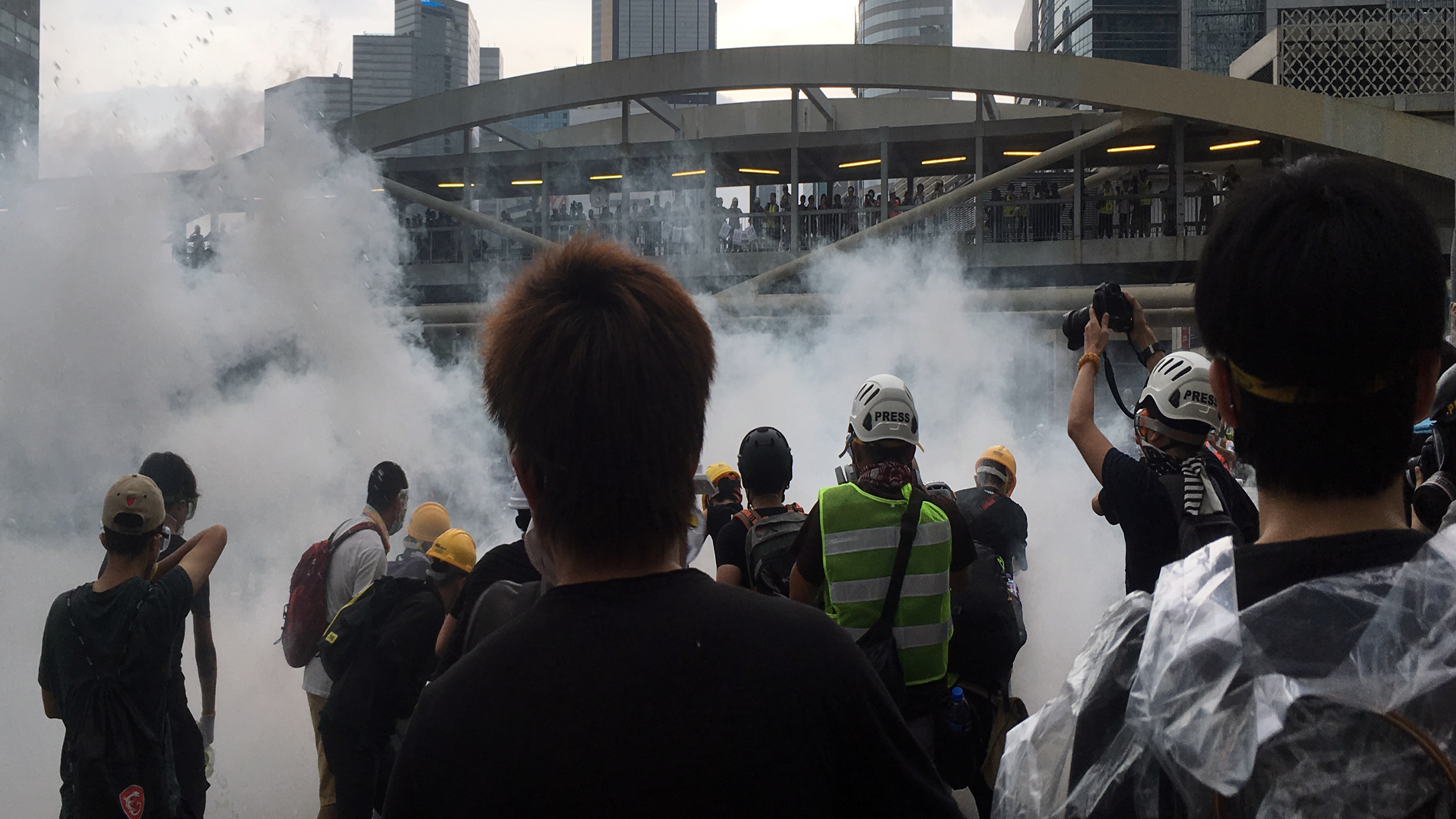The British were slow to introduce democratic elections to their colonial possession, Hong Kong. But in the two short decades since it was returned to China, Hong Kong’s democracy slid to a place where political candidates can be blocked for running from office; removed from office after having won elections; jailed; and physically attacked. Citizens have disappeared from within Hong Kong and abruptly reappeared in China—claiming that they went to China of their own volition, and also reporting that they’re suddenly facing charges in China.
Things are far worse in Hong Kong than they are in Taiwan, where I live. But Hong Kong and Taiwan face the same threat to their democratic freedoms from the authoritarian Chinese government, which insists that neither Hong Kong nor Taiwan has historically diverged from China to a degree sufficient to justify an independent identity.
The Hong Kong government is currently intent on passing an extradition bill allowing for the deportation of its citizens to China openly and legally, no kidnapping required. If passed, the law could be used to persecute Hong Kong’s political dissidents, such as democracy advocates or advocates of Hong Kong independence, by deporting them to China to face charges.
Some even fear that the bill could be used to detain those who are merely transiting through Hong Kong. In that possible future—say, by passing through Hong Kong International en route to a beach getaway in Hanoi—I could be dragged out of the airport and sent to China to face charges as an advocate of Taiwanese independence, which position is against the law in China. A lot of air traffic to various parts of Asia passes through Hong Kong, so this development would put many people in danger.
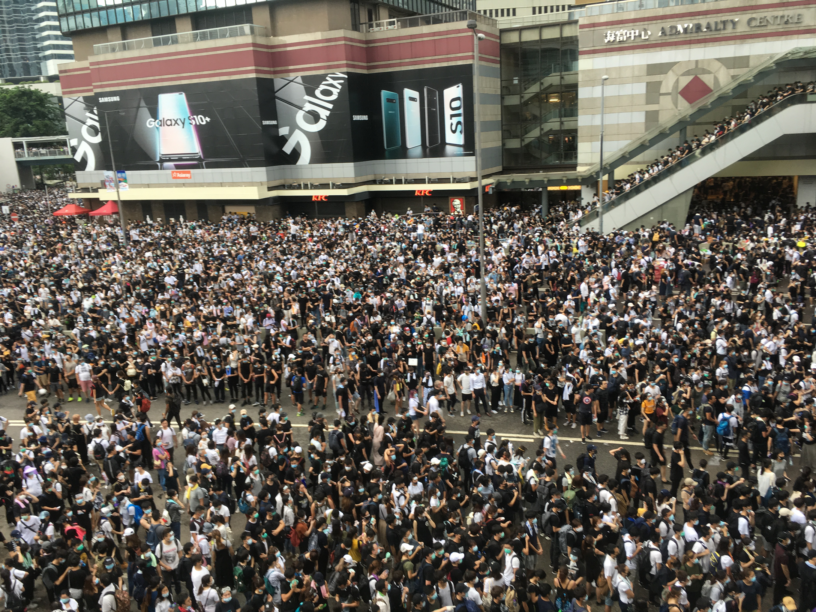
Last Sunday, on June 9th, over one million participants protested the proposed extradition bill in possibly the largest protest in Hong Kong history. Still, it appears that neither Beijing nor the Hong Kong government has any intention of backing down.
During the Sunflower Movement, a Hong Kong man made waves when he showed up at the occupation site with a sign that read, “I am a Hong Konger. Please step on Hong Kong’s corpse to advance, Taiwan, think of your path forward” (我是香港人, 請台灣踏在我們的屍體上, 想你們的路.)
I, for one, have no intention of living out that movie trope of self-sacrifice: “Go on without me! I’ll only slow you down! Save yourself!” After the demonstration last Sunday, I impulsively decided to take a reporting trip to Hong Kong. It helps that I have friends willing to take up the slack for my impulsiveness by assuming my responsibilities. But as I get older, the thing I fear most is becoming the kind of adult who ends up being so constrained by the weight of everyday life that they give up on their ideals.
I was unusually careful when I entered Hong Kong. I’d recently gone through an Internet security training, and then procrastinated on putting anything I’d learned into practice. The night before my flight I ran over security with a computer expert friend, and in the airport, I was extremely cautious.
I’m a small fry in the big scheme of things, but it wasn’t impossible that I would be stopped at the border, searched, or even just detained then and there. Aside from the kidnappings that have taken place there, there are areas of Hong Kong in which Chinese law applies now, so it doesn’t strike me as impossible that Chinese security forces might make use of the airport for kidnappings and things of like nature. Nowadays, I can’t be sure that each time I enter Hong Kong won’t be my last.
On my first night, my cell phone suddenly broke down in my hotel room. Which was not so surprising, since it had started getting weird after having been soaked with rain a few weeks before. But I had hoped that I would be able to make the phone last until I got back to Taiwan.
No luck. And I rapidly discovered—having set everything to two-factor authentication and put all these security measures in place the night before—that I would not be able to access anything I needed to do my reporting! I was locked out of the website for my publication, Twitter, my e-mail, Google Drive, etc.
What is this trip? I wondered to myself—just another strange, highly impulsive, and futile effort by me? (of which my life seems to be an endless succession?)
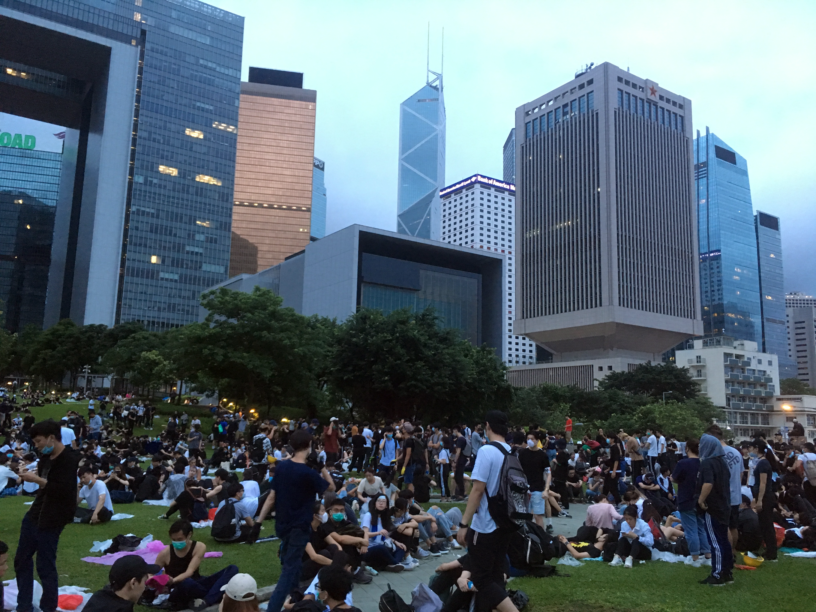
I could access only Facebook because I was still logged in, so I posted there about the fix I was in. And my friends came to the rescue again, crowdsourcing a place for me to repair my phone, and a Taiwanese journalist friend based in Hong Kong came to help me navigate the city. Crisis averted.
On Tuesday, the day after I arrived, I had dinner with a Hong Konger friend, an old classmate. There were calls for an action outside the Hong Kong Legislative Council, and news reports that the police had already set up barriers in the surrounding area; my friend she said she would show me where I needed to go, and likely routes to take.
As we walked in the direction of LegCo, she commented, “Those people look like they’re going to the protest,” pointing at several people ahead of us.
“Do they?” They looked like regular pedestrians to me.
“Can’t you tell?”
I thought about it. In Taiwan, I can pretty regularly see someone on the street and sort of peg them as an activist. There were usually clues in how they carried themselves or dressed themselves. I guess the word for this is “habitus,” as Pierre Bourdieu might say. But this was Hong Kong, and the cues were unfamiliar to me.
When I arrived at the protest outside LegCo, a few thousand people had already assembled; I was struck by how young they were. The protest seemed intense at the time, but in retrospect, the police weren’t the most aggressive. The demonstrators took over Tamar Park, located next to LegCo, with all the skyscrapers of the Hong Kong skyline visible from the park; a dramatic, movie-like location, with the fate of the whole city at stake. I took the first train back to the hotel at around 6:00 AM, wrapping up 20 hours of work on three hours of sleep.
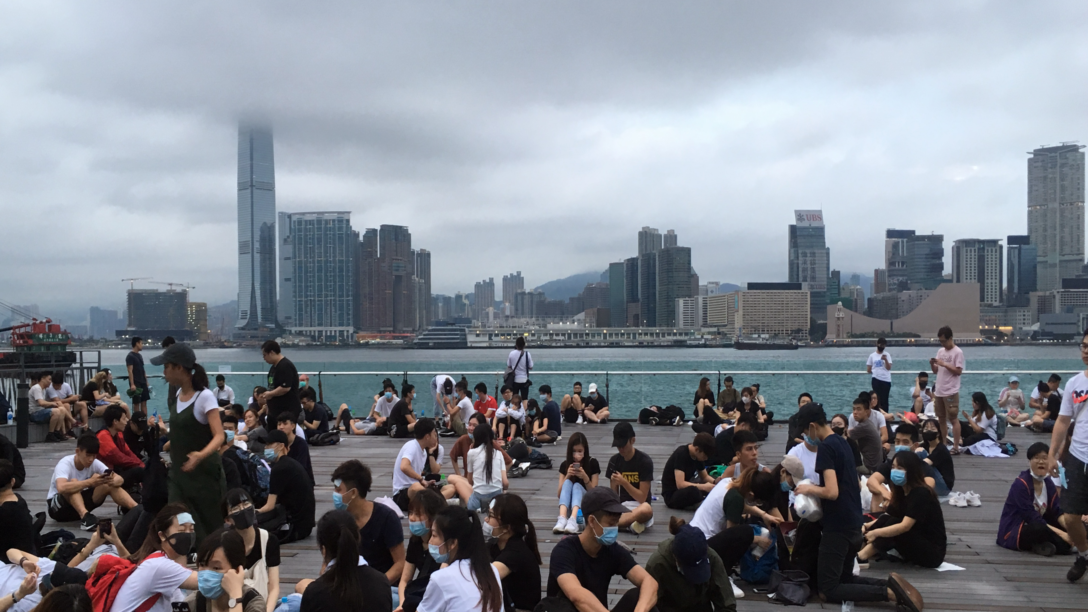
In the morning, the weird sense of an outdoor music festival returned to me, because there were so many other young people, the park was full of greenery, and the harbor and skyline created the ideal scenic environment for an outdoor music festival. Someone was even blasting psytrance on their phone. It was a strange sense of kinship with all these people I didn’t know. Sure, I’m always at protests full of people I don’t know in Taiwan, but I tend to just think of myself as one of them—here, I experienced a feeling a sense of kinship with people who were different from me.
The worst police violence since the 1997 Handover broke out the next day. I went back to the hotel, worked until 9:30 AM, slept, woke up at 1:30 PM, and dragged myself to the occupation. Not too long after I arrived, the police started firing tear gas. Water cannons, pellet bags, and rubber bullets were also fired, with one demonstrator losing an eye. Reportedly, close to twice as much tear gas was fired that day than during the entire 2014 Umbrella Movement.
When I cover protests in Taiwan, I make sure to establish a clear visual marker of difference between myself and the youth activists whose protests I’m writing about. They are often around the same age as me; I’m a former student activist myself. I usually dress more formally, with a button-down shirt. That way, if the police come in with force, when they see me, they conclude I’m a journalist, and usually ignore me.
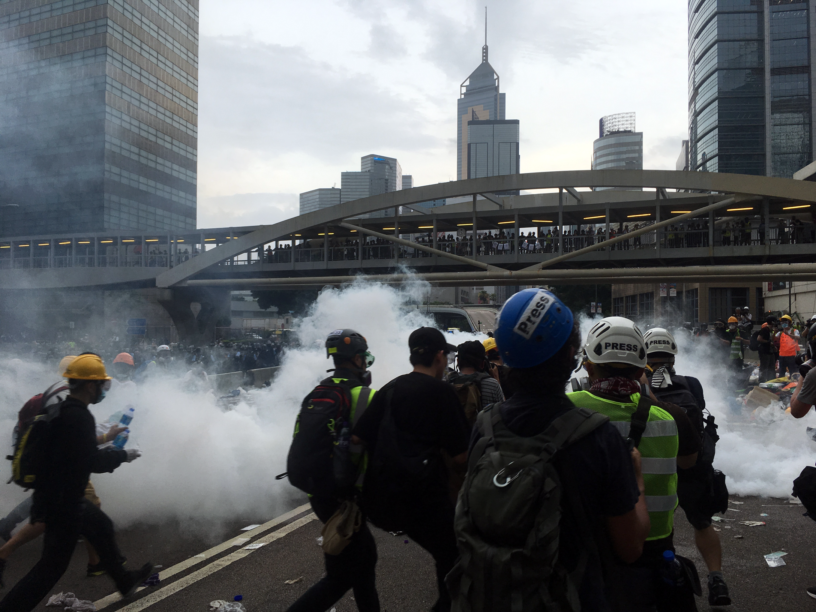
Because I’d heard that Hong Kong police had made journalists leave protest sites, I decided that I wouldn’t try to look the part of a journalist there; instead I’d just try to blend in with the student protesters. Since I don’t speak a word of Cantonese, I would just try to avoid saying anything.
So I wouldn’t have that same level of safety at protests I normally have in Taiwan—compounded by the fact that I couldn’t understand most of what was being said. Well, that was a risk I would have to take. I knew what to do to keep safe with riot police around. And, as it turned out, there were cases in which police directly shot at journalists that day in Hong Kong.
There was a lot of violence. Apart from the guy who lost an eye, a seventeen-year-old girl was hospitalized after inhaling tear gas. A video was circulated widely online of a man spitting out blood after being beaten by police, as well as another showing riot police surrounding and beating a lone, non-violent demonstrator. Still another showed police deliberately aiming weapons at journalists. In all, 72 were injured.
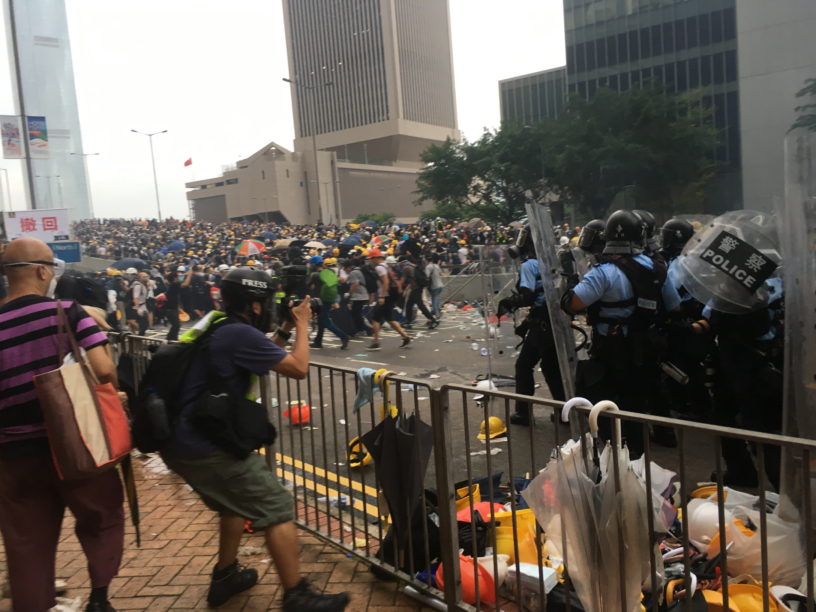
At one point I was huddled in the entrance of a closed McDonald’s as tear gas went off around me. Focused on my work, I failed to notice the riot police closing in until a stranger came and dragged me away.
In the process of writing updates and sharing them on my publication’s Facebook page, I suddenly realized that Facebook had blocked me from responding to comments on my posts or sharing from the Facebook page. Too bad. In an emergency, as with my broken cell phone, I’d been counting on being able to crowdsource knowledge there. I guess that option was out of the question now. I composed a series of angry tweets and fired them off at Facebook’s Twitter account, criticizing one giant social media network using another one. It was a reminder of the dangers of overreliance on any single corporate-owned platform.
The day was spent in a lot of panicky running around while trying to update events on my phone. Several times, I ended up coughing and tearing up after inhaling tear gas. Several times, I found myself just a few feet away from riot police. Somehow I got out of it with no scrapes.
But the dangers inherent in protests and clashes with the police are offset by this strange utopian element. In protests such as Occupy Wall Street, the Sunflower Movement, or the Umbrella Movement a space emerges in which everyone helps everybody, for example in which water, food, and supplies are provided to you for free, as if prefiguring a post-scarcity society. Having participated in Occupy Wall Street and the Sunflower Movement, I can attest to that.
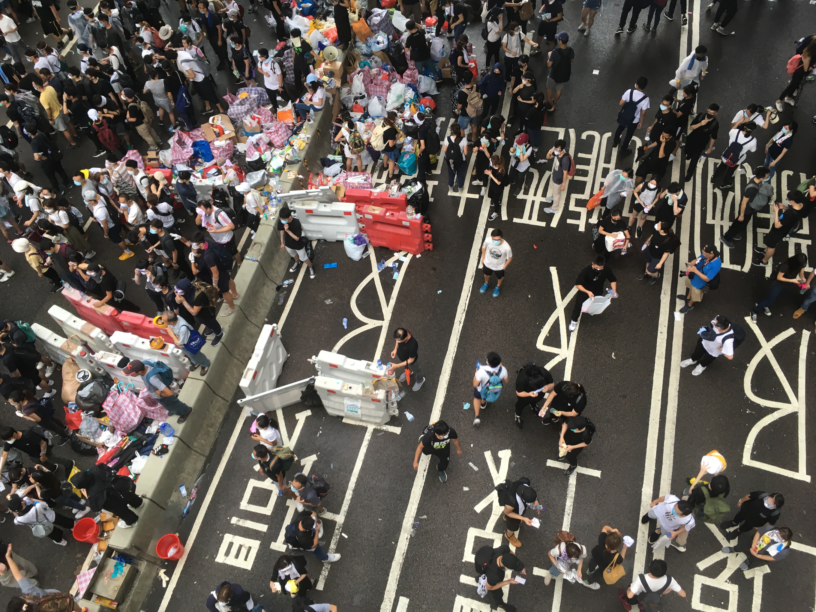
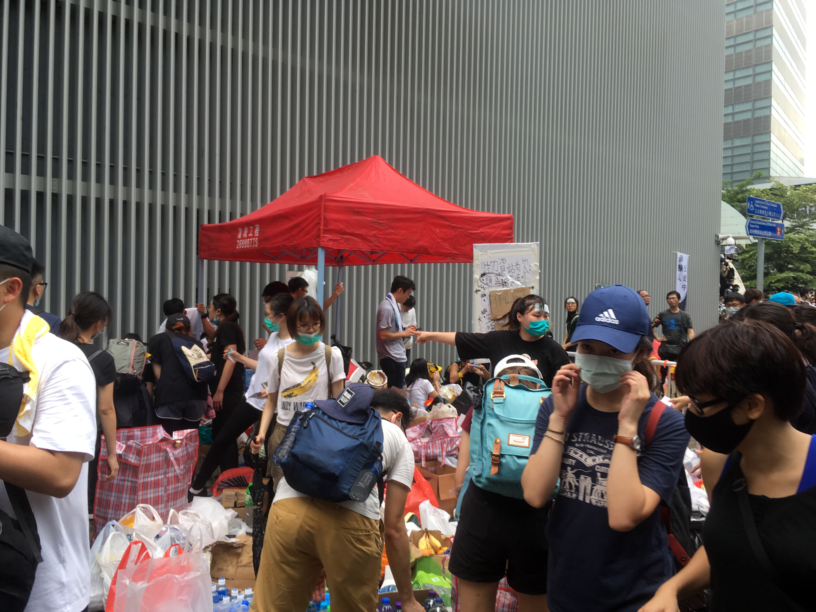
In a serious demonstration it’s the same: Suddenly everyone is helping each other out. When the police fire tear gas, you suddenly have people handing out goggles and masks, and water for washing out one’s eyes and throat. You have people going around with inhalers to make sure nobody is having trouble breathing.
Strangers wordlessly handed me a set of goggles when I was standing alone in a corner typing away on my phone. Another time, someone abruptly came up to me while I was standing alone, again typing a news update, said something in Cantonese I couldn’t understand, handed me a card for legal services if I needed them, and walked away. As I was rooting through a supply bag looking for a new set of goggles after my first ones broke, someone tried to offer me their goggles, though that meant they would have none.
Demonstrators would hand forward helmets, umbrellas, and other supplies to deflect tear gas shells when it looked like the police were about to let loose. They’d leave bottles of water, goggles, and masks scattered around beforehand so that anyone running from tear gas could grab them.
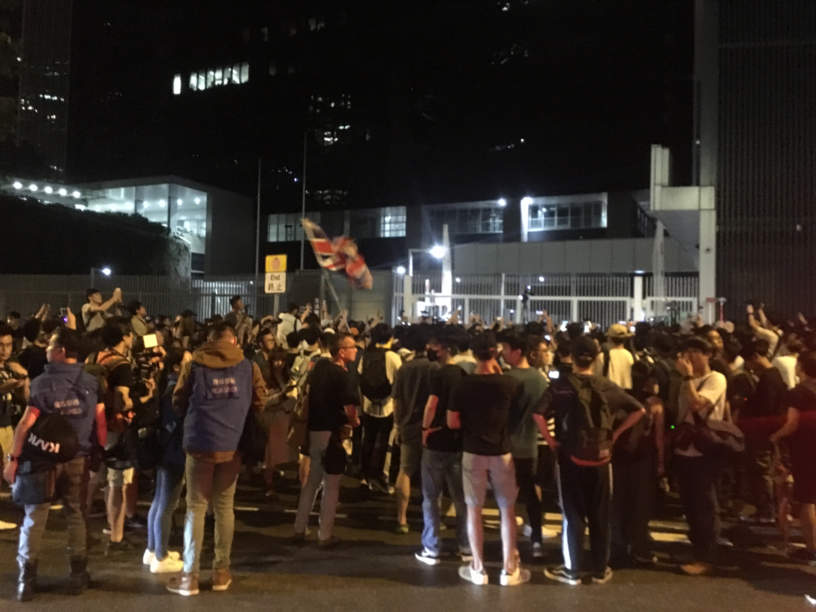
At night, the danger of being arrested sank in. An editor my publication works with had told me to write down her number on my hand, in case I was arrested and police took away my cell. I had forgotten to do that. The friend I’d had dinner with the night before had also told me to call if I needed to be bailed out or something like that. So spent thirty minutes wandering around trying to buy a pen or marker, eventually ending up in some upscale shopping mall. Police were stopping and demanding ID from young people they thought might be protestors, so I hid my goggles in my bag before I went into the mall. I overheard two well-dressed men who spoke English with British accents commented about the inconvenience of the “riots”, as they put it. I thought about the strangeness of inadvertently stepping into the life-worlds of these people, so far removed from the concerns of the people I’d just been with.
When I found a pen to write down the numbers, I found that my skin was too sweaty to write on. Whatever I wrote was washed away by sweat, leaving only a few patches of skin on my hand that I could cram writing onto.
In the end, despite some tense moments with police, nothing happened that night. Most of the demonstrators eventually withdrew. I went back home too, barely making the last train.
Many of the protestors, young as they were—too young to have participated in the Umbrella Movement—were noticeably cautious about their faces being visible, reflecting advances in face identification technology in the past five years since the Umbrella Movement.
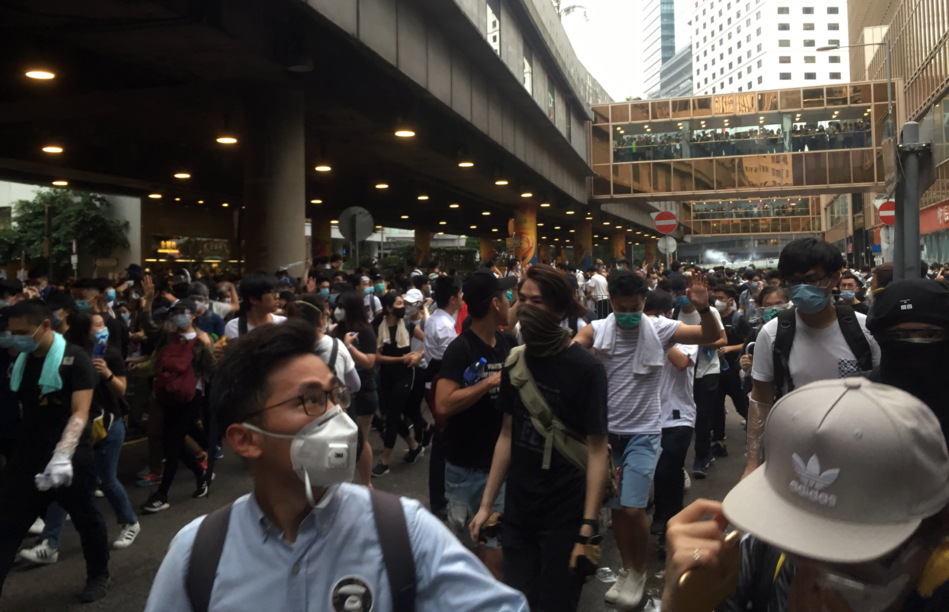
Some fear a dire end for the movement, with the possibility of its brutal repression by violence—even on the level of the Tiananmen Square Massacre. The thirtieth anniversary of the killings prompted reflections on this fearful possibility.
It bears remembering that China seemed to be opening up and improving in terms of political freedoms in the years immediately before Xi Jinping took power. The Umbrella Movement took place in 2014, only two years into Xi Jinping’s first presidential term. Things have become much worse in the years since. For example, the detention of one million Uighurs in concentration camps in Xinjiang, in western China, was a new development under Xi Jinping.
So it surprises me that the Hong Kong government appears for the moment to have backed off, as did Beijing behind it. I did not expect Beijing to blink in the face of a show of force by the Hong Kong people.
Some of the largest effects of the protests to date may have actually happened outside of Hong Kong. Taiwan has seen seven days of consecutive solidarity rallies—an unheard of event which didn’t even happen during the Umbrella Movement—organized by former Sunflower Movement activists, sectarian leftist groups, church groups, Hong Konger residents of Taiwan, Taiwanese living in Japan, and others.
Some suggest that present events in Hong Kong may have a strong impact in Taiwan, diminishing the pro-unification Kuomintang’s chances of victory in next year’s election, when this seemed just a few weeks ago almost an inevitability. Perhaps Hong Kong, in seeking to save itself, has saved Taiwan. This would be another instance in which Hong Kong and Taiwan’s destinies remain interlinked. But what I want to avoid at all costs is Taiwan advancing forward on the basis of Hong Kong’s demise.
Even if the Chinese government doesn’t yet rule Taiwan, there are days when I consider that one of the possible outcomes in which my life ends is getting shot behind a shed somewhere, when China rounds up the intellectuals and executes them all after militarily occupying Taiwan. The Kuomintang did just that, after all, when they came to Taiwan.
I would like to live forever, to outlast the rest of humanity and everything else and be the last living thing in the cosmos, existing as a disembodied, non-corporeal consciousness. Maybe then I could finally get some peace and quiet. But a life spent fighting for causes I believed in is not necessarily a bad one either.
In his book The Third Imagination of China (第三種中國想像), The Taiwanese theorist Wu Jieh-min—best known for his exegesis on the influence of the so-called “China factor” (中國因素) on Taiwan—wrote a vision of Taiwan, Hong Kong, and Chinese civil society uniting together to fight their shared enemy, the Chinese Communist Party. Such grassroots ties do, in fact, exist, and they continue to. Published a decade or so ago, the book was highly influential among activists in the years before the Sunflower Movement.
But in the event it’s become increasingly difficult for civil society in Taiwan, Hong Kong, and China to interact with one another; Taiwanese activists are frequently blocked from entering China, and Hong Kong and Chinese activists are sometimes prevented from leaving Hong Kong or China even if they are still able to enter Taiwan.
Still, moments which rupture the possible, which transform the quotidian everyday into something explosive, and in which a disparate set of individuals who might never come in contact with one another are thrown suddenly into situations that demand camaraderie—like those I observed over the past few days in Hong Kong—give me hope. This is what makes it possible for seeming inevitabilities—fate—to be reversed. Frankly speaking, moments like these are what I live for.
Other issues will flare up, that’s for sure. China’s ambitions on Hong Kong won’t end here. There may still even be efforts to pass the extradition bill.
I can’t say as to whether we’ll see a mass movement, or just periodic outbursts of intense but small demonstrations. I can’t say if this will all end in a bloody manner. As with five years ago, there are constantly rumors that the People’s Liberation Army is about to invade Hong Kong—though to date these have been just Internet rumors, inflated and spread in the age of social media and fake news. Yet all revolts, no matter how big they become, begin with solitary individuals willing to resist and fight; I believe that it’s this which allows one to defy fate. And it’s clear to me that such a will exists in Hong Kong. Call it idealism, if you like.
